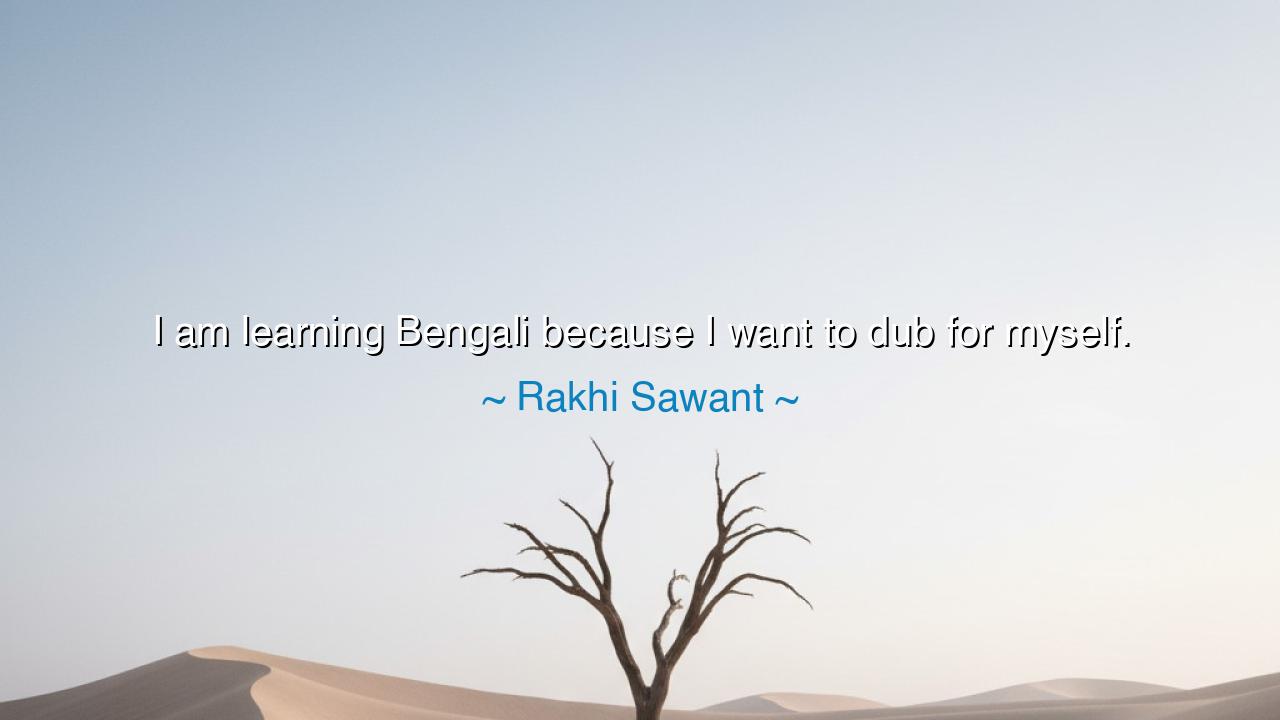
I am learning Bengali because I want to dub for myself.






In the councils of old, the elders taught that the truest authority is the power to carry one’s own voice across thresholds. Thus Rakhi Sawant’s vow—“I am learning Bengali because I want to dub for myself.”—is more than a professional note; it is a declaration of sovereignty. She refuses the borrowed throat and seeks to shape the resonance of her words in the ears of another people. In this small sentence lives a large truth: when we take up a language, we reclaim agency over how our story enters the world.
To learn a tongue is to apprentice the heart as well as the mouth. Bengali, with its rivered cadences and honeyed vowels, is not merely a code; it is a climate of feeling, a treasury of metaphors, a choreography for the face and breath. To speak it in one’s own dub is to match gesture to grain, emotion to idiom, timing to tradition. Substitution might convey a plot; only self-voicing can convey the soul. Hence the resolve “to dub for myself”: it is the artist’s oath to be present at the moment of meaning, not merely pictured in it.
There is an ethic inside that craft. Our age is full of intermediaries—helpful, yes, but sometimes usurping. Translators, editors, coaches, critics: all have their place. Yet the elder rule remains: whenever possible, let the speaker meet the listener face-to-face, breath-to-breath. A performer who learns the audience’s tongue is not chasing applause; she is practicing hospitality. She crosses the river rather than calling the village to her bank. And in crossing, she discovers that mastery does not shrink her first voice; it teaches it to travel.
Consider a story fit to anchor this meaning. Rabindranath Tagore, born of the same Bengal whose speech Sawant seeks, carried his own poems from Bengali into English, shaping Gitanjali with his hands so that the music would not be mis-shelved in another’s mouth. Because he translated himself, the poem kept its monsoon hush and mango-scent even in foreign rooms; its prayerfulness was not polished into pallor. Tagore proved that self-translation guards selfhood. So too a performer who dubs herself: she keeps the pulse of the role, its breath and break, intact across borders.
There is also the discipline of humility here. “I am learning,” she says—not “I have learned.” The ancients loved this grammar: the present continuous, the road underfoot. To learn a language is to submit to the alphabet like a novice at the gate, to be corrected by shopkeepers and soothed by schoolchildren, to stumble on honorifics and laugh at one’s own mouth. But the reward is the oldest treasure in art: precision. The joke lands because the vowel is honest; the lament moves because the consonants darken in the right place; the character lives because the rhythm is native to the role and not pasted on.
From her sentence, take a clear lesson about work and worth. If you want your story to arrive whole, shoulder the weight of learning the tools that carry it. Rely on others when you must, but bind your craft to skills that reduce the distance between intention and reception. Every inch you shorten in that distance is an inch of truth saved from distortion. This is as true for a singer and her dub as for a thinker and her math, a leader and his maps, a parent and their child’s heart.
Let counsel become practice. Choose one gate and pass through it daily: an alphabet learned at sunrise, ten verbs by noon, a line from a poem at dusk. Read a scene aloud until your breath and the language keep time. Seek a native friend who will strike out errors like weeds and water your courage. Keep a notebook of “untranslatables”—words that name feelings you needed but never had—and let them broaden your range as an artist and a human. Do this with patience, and you will find what the elders promised: the day when your voice, in another tongue, no longer sounds borrowed. It will be yours—capable of carrying love, anger, wit, and wonder without an escort—so that, like Sawant, you may truly dub for yourself and be wholly heard.






AAdministratorAdministrator
Welcome, honored guests. Please leave a comment, we will respond soon